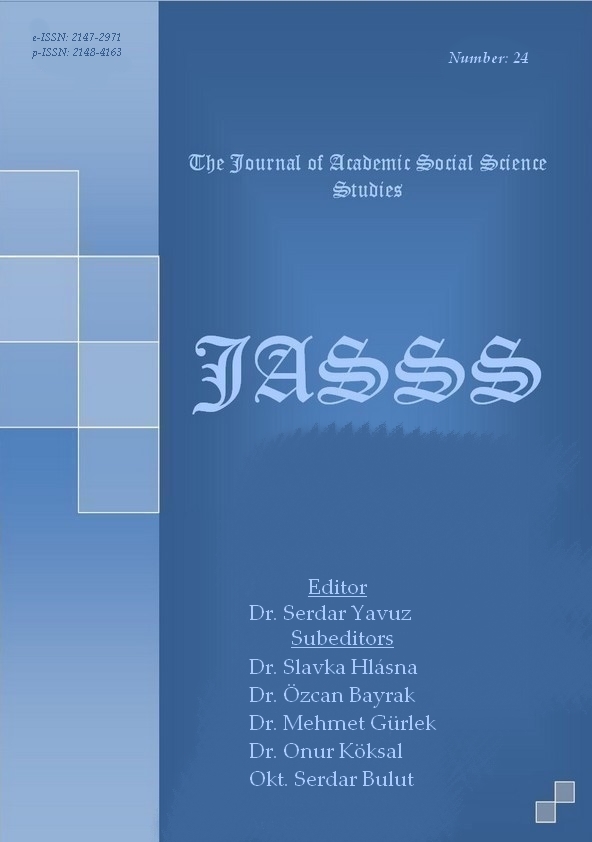YENİDEN KAZANIM EĞİTİMİNİN ORTAÖĞRETİM ÖĞRENCİLERİNİN EKOLOJİ KONUSUNDAKİ KAVRAMSAL ANLAMALARINA ETKİSİ: BESİN AĞI VE BESİN PİRAMİDİ ÖRNEĞİ
Author :
Abstract
Yeniden kazanım projeleri, atıkların azaltılması ya da zaten elimizde bulunan ve çöp olarak nitelendirdiğimiz kullanım dışı kalmış maddelerin tekrar kullanılabilir kılınması yoluyla doğal kaynakların korunması yanında enerjiden, paradan ve zamandan tasarruf sağlayarak bu problemin çözümünde vazgeçilmez bir rol üstlenmektedir. Yeniden kazanımın çevre kaynaklarının korunmasındaki ve sürdürülebilirliğindeki katkıları düşünüldüğünde bu yöndeki eğitimin yetersizliği büyük gelişme potansiyeli gösteren ülkemiz açısından önemli bir eksikliktir. Bu çalışmanın amacı geliştirilen bir yeniden kazanım eğitim programı ile ortaöğretim öğrencilerinin madde döngüleri ile ilgili ekoloji konularındaki kavramsal anlamalarında olumlu yönde bir değişiklik oluşturulup oluşturulamayacağının araştırılmasıdır. Araştırma, 2010-2011 eğitim-öğretim yılı güz döneminde ortaöğretim onuncu sınıflarında öğrenimlerini sürdüren 68 öğrenci (47 kız, 21 erkek) ile gerçekleştirilmiştir. Milli Eğitim Bakanlığına bağlı Talim ve Terbiye Kurulu tarafından belirlenen ortaöğretim biyoloji öğretim programına göre eğitim uygulanan 36 öğrenci (26 kız, 10 erkek) kontrol grubu, biyoloji öğretim programına Yeniden Kazanım Eğitim Programı entegre edilmiş dersler uygulanan 32 öğrenci (21 kız, 11 erkek) ise deney grubu olarak belirlenmiştir. Ön test-Son test kontrol gruplu yarı deneysel desen modelinde tasarlanan çalışmada, Yeniden Kazanım Eğitim Programının ortaöğretim öğrencilerinin ekoloji konusundaki kavramsal anlamalarını ne yönde etkilediğinin araştırılması amacıyla Ekosistem Ekolojisi Kavramsal Anlama Testi (EEKAT) uygulama öncesinde ve sonrasında bu öğrencilere uygulanmıştır. Deneysel uygulama sırasında Milli Eğitim Bakanlığına bağlı Talim ve Terbiye Kurulu’nun 03.06.2008 tarih ve 137 sayılı kararı ile kabul edilen ortaöğretim biyoloji öğretim programı çerçevesinde eğitim gerçekleştirilen grup kontrol grubu, biyoloji öğretim programına Yeniden Kazanım Eğitim Programı (YKEP) entegre edilmiş dersler uygulanan grup ise deney grubu olarak değerlendirilmiştir. YKEP ortaöğretim biyoloji öğretim programı dahilinde 10. sınıf müfredatında yer alan “Ekosistem Ekolojisi” konusu ile bir bütün oluşturacak şekilde hazırlanmıştır. Uygulama süresi “Ekosistem Ekolojisi” konusu için müfredatta belirlenmiş olan 10 ders saati ile sınırlı tutulmuştur. Araştırma kapsamında EEKAT ile elde edilen verilerin çözümlenmesi içerik analizi yöntemi ile gerçekleştirilmiştir. Yarı yapılandırılmış görüşme, deneysel uygulama bittikten
Keywords
Abstract
Recycling projects play an essential role in the resolution of such problems through reducing waste or enabling to reuse out-of-order materials in our possession that we may tend to describe as garbage and ultimately through minimization of energy, cost, and time as well as conservation of natural resources. Considering the contributions of recycling to the conservation and sustainability of environmental resources, lack of efficient education in this matter is a major handicap for our country having a great potential for development. The objective of this study is to analyze and determine whether a developed recycling education program would lead to a positive change in the conceptual understanding of ecological concepts associated with matter cycles by secondary school students. The research was conducted on 68 secondary school 10th grade students (47 female and 21 male students) studying in fall semester of 2010-2011 school year. The control group consists of 36 students (26 female and 10 male students) who were provided courses in accordance with secondary school biology curriculum implemented by the Turkish Education Board subordinated to the Ministry of National Education and the experimental group consists of 32 students (21 female and 11 male students) who were provided courses that included the Recycling Education Program (REP) integrated into the biology curriculum. The research has been contextualized as a quasi-experimental design model with pretest-posttest control group and the Ecosystem Ecology Conceptual Understanding Test (EECUT) was applied to the students in the research group prior to and after providing them with the respective courses with an aim to determine the effects of the Recycling Education Program on the conceptual understanding of ecological concepts by secondary school students. During the experimental process, the group of students who were instructed within the scope of secondary school biology curriculum implemented upon acceptance of the decree nr. 137 on June 3rd, 2008 of the Turkish Education Board subordinated to the Ministry of National Education were evaluated as the control group and the other group of students who were instructed courses that included the Recycling Education Program (REP) integrated into the biology curriculum were evaluated as the experimental group. The REP was prepared in a manner to integrate with the subject of “Ecosystem Ecology” included within the compass of secondary school biology curr





